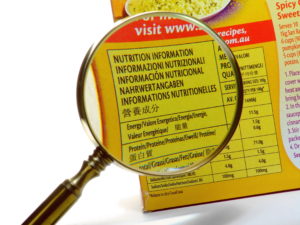E-learning course: General and nutritional labeling of prepackaged foods according to the Central American regulation: introduction and application principles.
General objective:
Train those responsible for the application of the regulations of general labeling of pre-packaged foods (RTCA 67.01.07: 10) and nutritional labeling of pre-packaged foods (RTCA 64 01.60: 10) for human consumption in the review and approval of labels of food marketed in the Central American region. 
Specific objectives:
- Understand the guidelines defined in the RTCA 67.01.07: 10 and in the RTCA 64 01.60: 10.
- To correctly apply the provisions established in the RTCA 67.01.07: 10 and in the RTCA 64 01.60: 10 regarding the revision and approval of pre-packaged food labels.
Methodology:
The course will be carried out through a virtual platform where 30 people can attend simultaneously. The e-learning course lasts approximately 4 weeks, during which participants can access their classes, tasks, evaluations, and discussions on their mobile phones, computers or laptops and/or tablets.
The course will be aimed at government officials in the Central American Region reviewing and approving prepackaged food labels, as well as employees of companies in the food and beverage industry responsible for preparing and reviewing food labels.
Responsible:
The e-learning course will be developed by the academic team of the National Center for Food Science and Technology (CITA) of the University of Costa Rica and supervised by the Nutrition and Food Technology Committee of ILSI Mesoamerica.
Start of the project: September 2017
For additional information to the email: ilsimesoamerica@gmail.com
Project progress:
From September 4 to October 2, 2017, the first e-learning course on food labeling was held, with the participation of 35 people, of whom 16 were representatives of the governments of Guatemala, El Salvador, Panama, and Costa Rica; The remaining 19 people were representatives of the food industry in Costa Rica, Guatemala, and Mexico.
The course requires a minimum grade of 80 for approval. On this occasion, only 51% of the people registered in the course approved it.
On April 2, 2018, the second group began. It was attended by 48 people, distributed as follows:
- 22 officials from the governments of Panama, Guatemala, El Salvador, and Costa Rica.
- 1 academic from Panama
- 17 food industry collaborators of Guatemala and Costa Rica
- 8 professionals in Nutrition and /or Food Engineering of Costa Rica.
The second course of 2018 began on July 16 with a total of 50 participants:
- 24 government officials from countries such as Honduras, Panama, El Salvador, Nicaragua, and Costa Rica.
- 1 academic from Panama.
- 39 food industry collaborators of Mexico, Colombia, Guatemala, and Costa Rica.
- 11 professionals in Nutrition and /or Food Engineering of Costa Rica.
The last course of 2018 was held on October 8. A total of 46 people were registered, corresponding to
- 24 officials from the governments of Guatemala, El Salvador, the Dominican Republic, and Costa Rica.
- 15 food industry collaborators of Mexico, the Dominican Republic, and Costa Rica.
- 7 professionals in Nutrition and /or Food Engineering of Costa Rica.
On March 4, 2019, the labeling courses began again with a total of 50 people distributed as follows:
- 34 government officials from Nicaragua, Honduras, and Costa Rica
- 1 academic from Colombia
- 11 food industry collaborators of Mexico and Costa Rica
- 4 professionals in Nutrition and /or Food Engineering of Costa Rica.
On June 17, 2019, the labeling courses began again with a total of 18 people distributed as follows:
- 8 government officials from Nicaragua and Honduras
- 1 academic from Costa Rica
- 4 food industry collaborators of Costa Rica
- 4 professionals in Nutrition and /or Food Engineering of Costa Rica